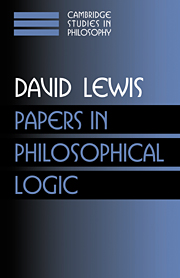Book contents
- Frontmatter
- Contents
- Dedication
- Introduction
- 1 Adverbs of quantification
- 2 Index, context, and content
- 3 ‘Whether’ report
- 4 Probabilities of conditionals and conditional probabilities II
- 5 Intensional logics without iterative axioms
- 6 Ordering semantics and premise semantics for counterfactuals
- 7 Logic for equivocators
- 8 Relevant implication
- 9 Statements partly about observation
- 10 Ayer's first empiricist criterion of meaning: why does it fail?
- 11 Analog and digital
- 12 Lucas against mechanism
- 13 Lucas against mechanism II
- 14 Policing the Aufbau
- 15 Finitude and infinitude in the atomic calculus of individuals (with Wilfrid Hodges)
- 16 Nominalistic set theory
- 17 Mathematics is megethology
- Index
13 - Lucas against mechanism II
Published online by Cambridge University Press: 05 June 2012
- Frontmatter
- Contents
- Dedication
- Introduction
- 1 Adverbs of quantification
- 2 Index, context, and content
- 3 ‘Whether’ report
- 4 Probabilities of conditionals and conditional probabilities II
- 5 Intensional logics without iterative axioms
- 6 Ordering semantics and premise semantics for counterfactuals
- 7 Logic for equivocators
- 8 Relevant implication
- 9 Statements partly about observation
- 10 Ayer's first empiricist criterion of meaning: why does it fail?
- 11 Analog and digital
- 12 Lucas against mechanism
- 13 Lucas against mechanism II
- 14 Policing the Aufbau
- 15 Finitude and infinitude in the atomic calculus of individuals (with Wilfrid Hodges)
- 16 Nominalistic set theory
- 17 Mathematics is megethology
- Index
Summary
J. R. Lucas serves warning that he stands ready to refute any sufficiently specific accusation that he is a machine. Let any mechanist say, to his face, that he is some particular machine M; Lucas will respond by producing forthwith a suitable Gödel sentence φM. Having produced φM, he will then argue that – given certain credible premises about himself – he could not have done so if the accusation that he was M had been true. Let the mechanist try again; Lucas will counter him again in the same way. It is not possible to accuse Lucas truly of being a machine.
I used to think that the accusing mechanist interlocutor was an expository frill, and that Lucas was really claiming to be able to do something that no machine could do. But I was wrong; Lucas insists that the interlocutor does play an essential role. He writes that “the argument is a dialectical one. It is not a direct proof that the mind is something more than a machine; but a schema of disproof for any particular version of mechanism that may be put forward. If the mechanist maintains any specific thesis, I show that a contradiction ensues. But only if. It depends on the mechanist making the first move and putting forward his claim for inspection.” Very well. I promise to take the dialectical character of Lucas's argument more seriously this time – and that shall be his downfall.
- Type
- Chapter
- Information
- Papers in Philosophical Logic , pp. 170 - 173Publisher: Cambridge University PressPrint publication year: 1997



